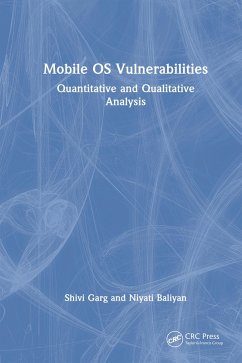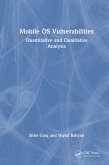Shivi Garg, Niyati Baliyan
Mobile OS Vulnerabilities (eBook, PDF)
Quantitative and Qualitative Analysis
47,95 €
47,95 €
inkl. MwSt.
Sofort per Download lieferbar

24 °P sammeln
47,95 €
Als Download kaufen

47,95 €
inkl. MwSt.
Sofort per Download lieferbar

24 °P sammeln
Jetzt verschenken
Alle Infos zum eBook verschenken
47,95 €
inkl. MwSt.
Sofort per Download lieferbar
Alle Infos zum eBook verschenken

24 °P sammeln
Shivi Garg, Niyati Baliyan
Mobile OS Vulnerabilities (eBook, PDF)
Quantitative and Qualitative Analysis
- Format: PDF
- Merkliste
- Auf die Merkliste
- Bewerten Bewerten
- Teilen
- Produkt teilen
- Produkterinnerung
- Produkterinnerung

Bitte loggen Sie sich zunächst in Ihr Kundenkonto ein oder registrieren Sie sich bei
bücher.de, um das eBook-Abo tolino select nutzen zu können.
Hier können Sie sich einloggen
Hier können Sie sich einloggen
Sie sind bereits eingeloggt. Klicken Sie auf 2. tolino select Abo, um fortzufahren.

Bitte loggen Sie sich zunächst in Ihr Kundenkonto ein oder registrieren Sie sich bei bücher.de, um das eBook-Abo tolino select nutzen zu können.
This book offers in-depth analysis of security vulnerabilities in different mobile operating systems. It provides methodology and solutions for handling Android malware and vulnerabilities and transfers the latest knowledge in machine learning and deep learning models towards this end.
- Geräte: PC
- mit Kopierschutz
- eBook Hilfe
Andere Kunden interessierten sich auch für
![Mobile OS Vulnerabilities (eBook, ePUB) Mobile OS Vulnerabilities (eBook, ePUB)]() Shivi GargMobile OS Vulnerabilities (eBook, ePUB)47,95 €
Shivi GargMobile OS Vulnerabilities (eBook, ePUB)47,95 €![Intelligent Mobile Malware Detection (eBook, PDF) Intelligent Mobile Malware Detection (eBook, PDF)]() Tony ThomasIntelligent Mobile Malware Detection (eBook, PDF)46,95 €
Tony ThomasIntelligent Mobile Malware Detection (eBook, PDF)46,95 €![What To Do When You Get Hacked (eBook, PDF) What To Do When You Get Hacked (eBook, PDF)]() Shimon BrathwaiteWhat To Do When You Get Hacked (eBook, PDF)40,95 €
Shimon BrathwaiteWhat To Do When You Get Hacked (eBook, PDF)40,95 €![Innovative Technologies for Future Living (eBook, PDF) Innovative Technologies for Future Living (eBook, PDF)]() Sandip SenInnovative Technologies for Future Living (eBook, PDF)28,95 €
Sandip SenInnovative Technologies for Future Living (eBook, PDF)28,95 €![Losing the Cybersecurity War (eBook, PDF) Losing the Cybersecurity War (eBook, PDF)]() Steve KingLosing the Cybersecurity War (eBook, PDF)31,95 €
Steve KingLosing the Cybersecurity War (eBook, PDF)31,95 €![Intelligent Mobile Malware Detection (eBook, ePUB) Intelligent Mobile Malware Detection (eBook, ePUB)]() Tony ThomasIntelligent Mobile Malware Detection (eBook, ePUB)46,95 €
Tony ThomasIntelligent Mobile Malware Detection (eBook, ePUB)46,95 €![Designing Secure Systems (eBook, PDF) Designing Secure Systems (eBook, PDF)]() Michael MeloneDesigning Secure Systems (eBook, PDF)47,95 €
Michael MeloneDesigning Secure Systems (eBook, PDF)47,95 €-
-
-
This book offers in-depth analysis of security vulnerabilities in different mobile operating systems. It provides methodology and solutions for handling Android malware and vulnerabilities and transfers the latest knowledge in machine learning and deep learning models towards this end.
Dieser Download kann aus rechtlichen Gründen nur mit Rechnungsadresse in A, B, BG, CY, CZ, D, DK, EW, E, FIN, F, GR, HR, H, IRL, I, LT, L, LR, M, NL, PL, P, R, S, SLO, SK ausgeliefert werden.
Produktdetails
- Produktdetails
- Verlag: Taylor & Francis eBooks
- Seitenzahl: 189
- Erscheinungstermin: 17. August 2023
- Englisch
- ISBN-13: 9781000924466
- Artikelnr.: 68192133
- Verlag: Taylor & Francis eBooks
- Seitenzahl: 189
- Erscheinungstermin: 17. August 2023
- Englisch
- ISBN-13: 9781000924466
- Artikelnr.: 68192133
- Herstellerkennzeichnung Die Herstellerinformationen sind derzeit nicht verfügbar.
Shivi Garg has Doctor of Philosophy in December 2021 from Information Technology Department, Indira Gandhi Delhi Technical University for Women, (IGDTUW), Delhi, India. Thesis title: Design and Analysis of Mobile Application Vulnerabilities. She is also a post graduate in Information security from Delhi Technological University (DTU) Delhi, India. She has teaching and research experience since August 2016. Currently she is an Assistant Professor at J.C. Bose University of Science & Technology, YMCA, Faridabad. Her research interests include- Information Security, mobile security, cyber security, and Machine learning. Her publication and other details can be found at: https://sites.google.com/view/shivigarg/home
Niyati Baliyan is an Assistant Professor, Department of Computer Engineering, National Institute of Technology Kurukshetra, Haryana. She has attained Doctor of Philosophy from Computer Science Department, Indian Institute of Technology (IIT) Roorkee, India. Her thesis title was "Quality Assessment of Semantic Web based Applications". She also has a Post Graduate Certificate in Information Technology from Sheffield Hallam University, Sheffield, U.K.Niyati obtained Chancellor's Gold Medal for being University topper during post graduate studies at Gautam Buddha University. She is co-author of "Semantic Web Based Systems: Quality Assessment Models, SpringerBriefs in Computer Science",2018. Her research interests include-Knowledge Engineering, Machine Learning, Healthcare analytics, Recommender systems, Information Security, and Natural Language Processing. Her publication and other details can be found at: https://sites.google.com/site/niyatibaliyan.
Niyati Baliyan is an Assistant Professor, Department of Computer Engineering, National Institute of Technology Kurukshetra, Haryana. She has attained Doctor of Philosophy from Computer Science Department, Indian Institute of Technology (IIT) Roorkee, India. Her thesis title was "Quality Assessment of Semantic Web based Applications". She also has a Post Graduate Certificate in Information Technology from Sheffield Hallam University, Sheffield, U.K.Niyati obtained Chancellor's Gold Medal for being University topper during post graduate studies at Gautam Buddha University. She is co-author of "Semantic Web Based Systems: Quality Assessment Models, SpringerBriefs in Computer Science",2018. Her research interests include-Knowledge Engineering, Machine Learning, Healthcare analytics, Recommender systems, Information Security, and Natural Language Processing. Her publication and other details can be found at: https://sites.google.com/site/niyatibaliyan.
1. Introduction. 2. Background. 3. Relevant Works and Studies Related to Android and iOS. 4. A Parallel Classifier Scheme for Vulnerability Detection in Android. 5. Classification of Android Malware Using Ensemble Classifiers. 6. Text Processing-Based Malware-to-Vulnerability Mapping for Android. 7. Android Vulnerabilities Impact Analysis on Availability, Integrity, and Confidentiality Triad at the Architectural Level. 8. Conclusion and Future Directions.
1. Introduction. 2. Background. 3. Relevant Works and Studies Related to
Android and iOS. 4. A Parallel Classifier Scheme for Vulnerability
Detection in Android. 5. Classification of Android Malware Using Ensemble
Classifiers. 6. Text Processing-Based Malware-to-Vulnerability Mapping for
Android. 7. Android Vulnerabilities Impact Analysis on Availability,
Integrity, and Confidentiality Triad at the Architectural Level. 8.
Conclusion and Future Directions.
Android and iOS. 4. A Parallel Classifier Scheme for Vulnerability
Detection in Android. 5. Classification of Android Malware Using Ensemble
Classifiers. 6. Text Processing-Based Malware-to-Vulnerability Mapping for
Android. 7. Android Vulnerabilities Impact Analysis on Availability,
Integrity, and Confidentiality Triad at the Architectural Level. 8.
Conclusion and Future Directions.
1. Introduction. 2. Background. 3. Relevant Works and Studies Related to Android and iOS. 4. A Parallel Classifier Scheme for Vulnerability Detection in Android. 5. Classification of Android Malware Using Ensemble Classifiers. 6. Text Processing-Based Malware-to-Vulnerability Mapping for Android. 7. Android Vulnerabilities Impact Analysis on Availability, Integrity, and Confidentiality Triad at the Architectural Level. 8. Conclusion and Future Directions.
1. Introduction. 2. Background. 3. Relevant Works and Studies Related to
Android and iOS. 4. A Parallel Classifier Scheme for Vulnerability
Detection in Android. 5. Classification of Android Malware Using Ensemble
Classifiers. 6. Text Processing-Based Malware-to-Vulnerability Mapping for
Android. 7. Android Vulnerabilities Impact Analysis on Availability,
Integrity, and Confidentiality Triad at the Architectural Level. 8.
Conclusion and Future Directions.
Android and iOS. 4. A Parallel Classifier Scheme for Vulnerability
Detection in Android. 5. Classification of Android Malware Using Ensemble
Classifiers. 6. Text Processing-Based Malware-to-Vulnerability Mapping for
Android. 7. Android Vulnerabilities Impact Analysis on Availability,
Integrity, and Confidentiality Triad at the Architectural Level. 8.
Conclusion and Future Directions.







